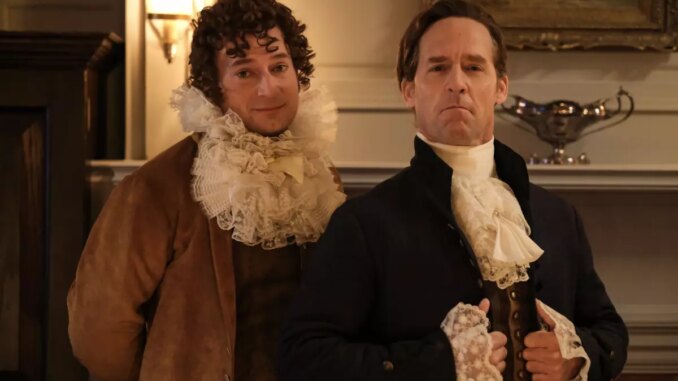
The spectral halls of Woodstone Mansion, already a veritable melting pot of historical epochs and clashing personalities, often serve as the stage for the most unexpected dramas. Yet, few could have predicted the profound, almost existential, rivalry that would bloom between the stern Puritan, Isaac Higgintoot, and the illustrious Founding Father, Alexander Hamilton, all thanks to a humble bag of Ruffles potato chips. This wasn't a clash over political ideologies, revolutionary principles, or even the proper way to tie a cravat; it was a surprisingly fierce, utterly ludicrous, and deeply illustrative battle for the very soul of snackdom, played out by two men long since departed from the mortal coil.
For Isaac Higgintoot, a man whose entire existence was predicated on plainness, piety, and the strict adherence to a somber, unadorned life, the Ruffles potato chip was an abomination. Its very name, "Ruffles," suggested frivolity and unnecessary ornamentation – a crinkled, corrugated testament to human indulgence. The loud, almost offensive, crunch that accompanied its consumption was, to Isaac, an audible declaration of decadence, a cacophony of gluttony that echoed through the quiet sanctity he longed for. He saw in each ridged chip a symbol of moral decay, a greasy, salt-laden harbinger of societal collapse. To witness the living, particularly Sam, or even worse, Hamilton, partake in such a sacrilege was to watch the unraveling of all he held sacred, a profane act of culinary hedonism that grated on his very being. His disapproval wasn't merely expressed in exasperated sighs; it was a palpable wave of spiritual distress that could make the very air around the chips seem to thicken with righteous judgment.
Alexander Hamilton, conversely, saw the Ruffles chip through an entirely different lens. As a man of the Enlightenment, a visionary who championed progress, innovation, and the burgeoning American spirit of ingenuity, the Ruffles chip, in its own absurd way, represented a micro-miracle of human endeavor. It was a perfected snack: engineered for maximum crunch, flavored with a satisfying salinity, and packaged for convenient consumption. While he might never have deigned to invent such a thing in his mortal life, as a ghost, he could appreciate its elegant simplicity and the sheer audacity of its existence. He enjoyed them with a performative relish, each deliberate crunch a subtle jab at Isaac's archaic sensibilities. For Hamilton, the Ruffles chip was a testament to the limitless potential of a nation he helped forge – even if that potential extended to perfectly crafted potato products. His enjoyment was not just about the taste; it was about the subtle, intellectual victory over Isaac's Luddite tendencies, a quiet affirmation of the modern world's superiority over Puritan austerity.
The rivalry, therefore, wasn't fought with dueling pistols or treatises, but with the very act of eating chips. Isaac would deliver withering stares and whispered condemnations, perhaps even attempting to phase through the offending snack bag, only to be met by Hamilton’s smug, almost arrogant, chewing. Hamilton, in turn, might ostentatiously offer a chip to Sam, making sure to emphasize its "crisp, corrugated ridges" or its "robust, savory flavor" within earshot of Isaac. The conflict was less about the chips themselves and more about the fundamental clash of their worldviews: Isaac's rigid adherence to antiquated morality versus Hamilton's embrace of progress and his disdain for what he perceived as irrational prudishness.
This unlikely skirmish, born from a bag of crinkled potatoes, brilliantly illustrates the comedic genius of Ghosts. It highlights how even the most mundane, modern objects can become the ultimate litmus test for character, stripping away historical grandeur to reveal petty grievances and deeply held beliefs. Isaac Higgintoot, the solemn Puritan, becomes comically unhinged by a chip, while Alexander Hamilton, the nation-builder, finds a new arena for his intellectual dominance in the realm of snack consumption. Their rivalry over Ruffles isn't just funny; it’s a poignant, if absurd, reminder that human nature – with all its biases, fascinations, and enduring contradictions – persists even in the afterlife, proving that some battles, no matter how trivial their origin, are truly timeless.